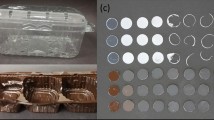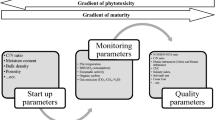Summary
Bacterial soft rot of freshly harvested potatoes was associated with the exhaustion of O2 and the accumulation of CO2 in the atmosphere surrounding the tubers. The rates of depletion of O2 and accumulation of CO2 were correlated with the temperature of the respiring potatoes. When potatoes were held at temperatures near 30 C and aerated with humidified air, little decay developed during 3-day test periods. By contrast, when potatoes were placed in sealed containers at the same temperature O2 was depleted, CO2 exceeded 30% and soft rot developed in nearly all potatoes. The rate of CO3 accumulation in trucks being loaded with warm potatoes in consumer packages paralleled that found in experimental containers under controlled conditions. These results suggest that O2 depletion and CO2 accumulation may occur in loads of potatoes during loading and transit and accelerate the development of bacterial soft rot. The rapidity of CO2 accumulation would depend on the temperature of the potatoes and the rapidity of air movement through the load. The experimental results indicate that soft rot can be greatly reduced if the loaded potatoes are cooled to 13–18 C., or the load is so constructed that humid air circulates around warm potatoes.
Resumen
La presencia de la podredumbre blanda bacteriana en papas recien cosechadas fue asociada con el agotamiento de O2 y la acumulación de CO2 en la atmósfera alrededor de los tubérculos. La velocidad de agotamiento del O2 y la acumulación del CO2 fueron correlacionadas con la temperatura de papas en proceso de respiración. Cuando las papas fueron mantenidas a temperaturas alrededor de 30 C y aereadas con aire húmedo, hubo poca descomposición en ensayos que comprendieron períodos de tres dias. Por el contrario, cuando las papas fueron colocadas en envases cerrados a la misma temperatura el O2 se agotó, el CO2 aumentó sobre el 30% y la podredumbre blanda se desarrolló en casi todas las papas. La velocidad de acumulación del CO2 en camiones cargados con papas cálidas en paquetes de consumo igualó aquella encontrada en envases expérimentales bajo condiciones controladas. Estos resultados sugieren que el agotamiento de O2 y la acumulación de CO2 puede ocurrir durante el embarque y transporte de las papas y acelerar el desarrolló de la podredumbre blanda. La rapidez con que se acumule el CO2 puede depender de la temperatura de las papas y la rapidez del movimiento de aire a través de la carga. Los resultados experimentales indican que la podredumbre blanda puede ser reducida altamente si la carga de papas es mantenida a una temperatura de 13–18 C., o si se modifica la carga de manera que circule aire húmedo alrededor de las papas cálidas.
Similar content being viewed by others
Literature Cited
Artschwager, E. 1927. Wound periderm formation in the potato as affected by temperature and humidity. J. Agr. Res. 35: 995–1000.
Nielsen, L. W. 1960. Decay of freshly harvested potatoes in air-tight containers. Phytopathology 50: 649. (Abstr.)
Smith, W. L., Jr. and Helen F. Smart. 1955. Relation of soft rot development to protective barriers in Irish potato slices. Phytopathology 45: 649–654.
Thomas, M., S. L. Ranson and J. A. Richardson. 1956. Respiration, p. 229–356.In Plant Physiology. Fourth edition. Philosophical Library, Inc., New York, N. Y.
Additional information
Paper Number 2510 of the Journal Series of the North Carolina State University Agricultural Experiment Station, Raleigh, North Carolina.
Rights and permissions
About this article
Cite this article
Nielsen, L.W. Accumulation of Respiratory Co2 around potato tubers in relation to bacterial soft rot. American Potato Journal 45, 174–181 (1968). https://doi.org/10.1007/BF02849145
Accepted:
Issue Date:
DOI: https://doi.org/10.1007/BF02849145




